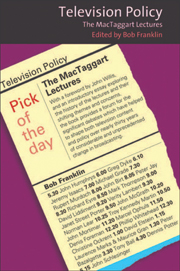Book contents
- Frontmatter
- Contents
- Acknowledgements
- Foreword
- Introduction
- The James MacTaggart Lectures
- TV Drama: The Case against Naturalism
- Naturalism and Television
- Taboos in Television
- Signposting Television in the 1980s: The Fourth Television Channel
- Television Drama, Censorship and the Truth
- The Day after Tomorrow: The Future of Electronic Publishing
- The Primacy of Programmes in the Future of Broadcasting
- Reflections on Working in Film and Television
- ‘Opening up the Fourth Front’: Micro Drama and the Rejection of Naturalism
- Power and Pluralism in Broadcasting
- Ethics, Broadcasting and Change: The French Experience
- Freedom in Broadcasting
- Deregulation and Quality Television
- The Future of Television: Market Forces and Social Values
- The Future of the BBC
- Occupying Powers
- A Culture of Dependency: Power, Politics and Broadcasters
- Talent versus Television
- A Glorious Future: Quality Broadcasting in the Digital Age
- Rewarding Creative Talent: The Struggle of the Independents
- Television versus the People
- Public-Interest Broadcasting: A New Approach
- A Time for Change
- The Soul of British Television
- Television's Creative Deficit
- Freedom of Choice: Public-Service Broadcasting and the BBC
- First Do No Harm
- Appendix A Edinburgh International Television Festival, 29 August–2 September 1977: Programme
- Appendix B Précis of Ted Turner, James MacTaggart Lecture 1982; Dr Jonathan Miller, James MacTaggart Lecture 1983
- Index
Ethics, Broadcasting and Change: The French Experience
from The James MacTaggart Lectures
Published online by Cambridge University Press: 05 August 2013
- Frontmatter
- Contents
- Acknowledgements
- Foreword
- Introduction
- The James MacTaggart Lectures
- TV Drama: The Case against Naturalism
- Naturalism and Television
- Taboos in Television
- Signposting Television in the 1980s: The Fourth Television Channel
- Television Drama, Censorship and the Truth
- The Day after Tomorrow: The Future of Electronic Publishing
- The Primacy of Programmes in the Future of Broadcasting
- Reflections on Working in Film and Television
- ‘Opening up the Fourth Front’: Micro Drama and the Rejection of Naturalism
- Power and Pluralism in Broadcasting
- Ethics, Broadcasting and Change: The French Experience
- Freedom in Broadcasting
- Deregulation and Quality Television
- The Future of Television: Market Forces and Social Values
- The Future of the BBC
- Occupying Powers
- A Culture of Dependency: Power, Politics and Broadcasters
- Talent versus Television
- A Glorious Future: Quality Broadcasting in the Digital Age
- Rewarding Creative Talent: The Struggle of the Independents
- Television versus the People
- Public-Interest Broadcasting: A New Approach
- A Time for Change
- The Soul of British Television
- Television's Creative Deficit
- Freedom of Choice: Public-Service Broadcasting and the BBC
- First Do No Harm
- Appendix A Edinburgh International Television Festival, 29 August–2 September 1977: Programme
- Appendix B Précis of Ted Turner, James MacTaggart Lecture 1982; Dr Jonathan Miller, James MacTaggart Lecture 1983
- Index
Summary
Christine Ockrent's lecture explores and analyses the ethical consequences of rapid change in the French broadcasting system. She details the shift at TF1 Network from a public-sector organisation run by ‘miserly, incompetent civil servants’ to a private-sector broadcaster, owned by a civil engineering company which believes there is ‘no reason why a TV station should be run differently from a pipes factory’ and whose ethical ‘code of behaviour’ includes ‘simple mottos’ such as ‘Kill the enemy, the competition, the weak’. Ockrent believes that this subject will interest a British audience because ‘in many ways the French situation epitomises the fears which many of you nourish about deregulation’.
Ockrent makes three key claims. First, while deregulation may be a prerequisite for the expansion of broadcasting, it is ‘inevitably damaging to standards’. Ratings have become the key consideration with game shows, sitcoms, American series and films dominating French television schedules resulting in ‘conformity and uniformity’. The paradox which emerges is that ‘we have more channels … but we seem to have less consumer choice…. Standards of news programmes have also declined as …some presenters … imitate entertainment shows… and …what is interesting has long since overrun what is important…. Ockrent…s second argument is that whatever its dangers, expansion is essential if the broadcasting system is to survive and compete internationally. This will require large capital investment of the kind Murdoch has made in the UK to develop satellite and cable channels in France.
- Type
- Chapter
- Information
- Television PolicyThe MacTaggart Lectures, pp. 123 - 130Publisher: Edinburgh University PressPrint publication year: 2005



